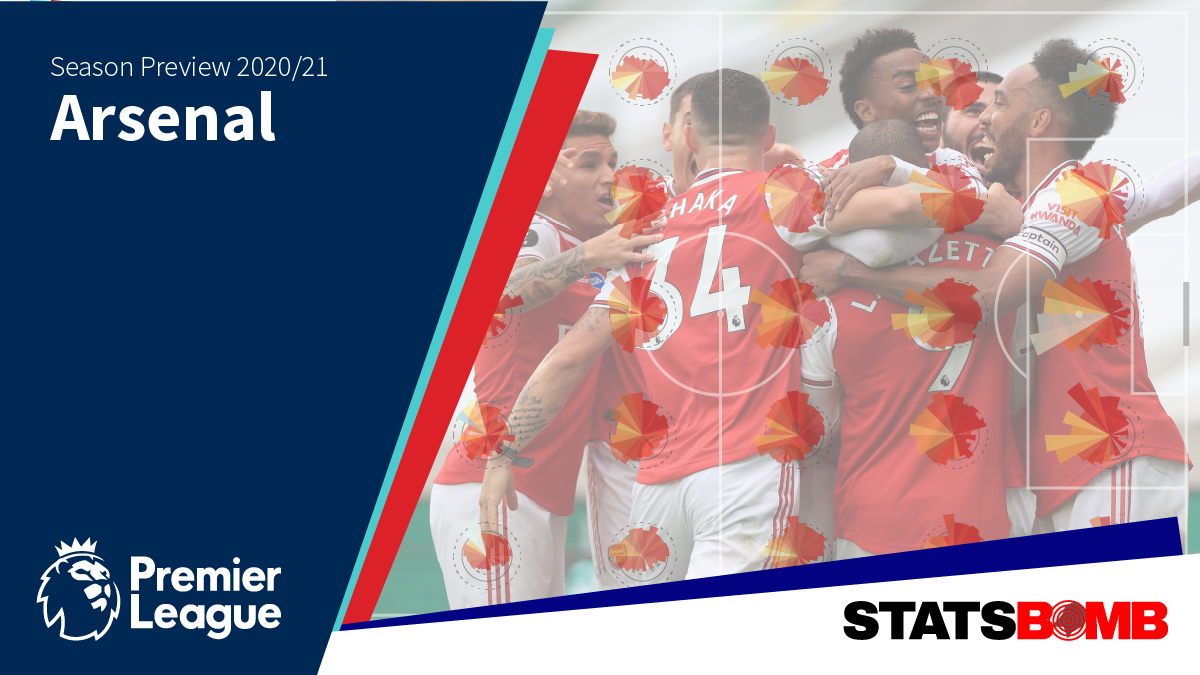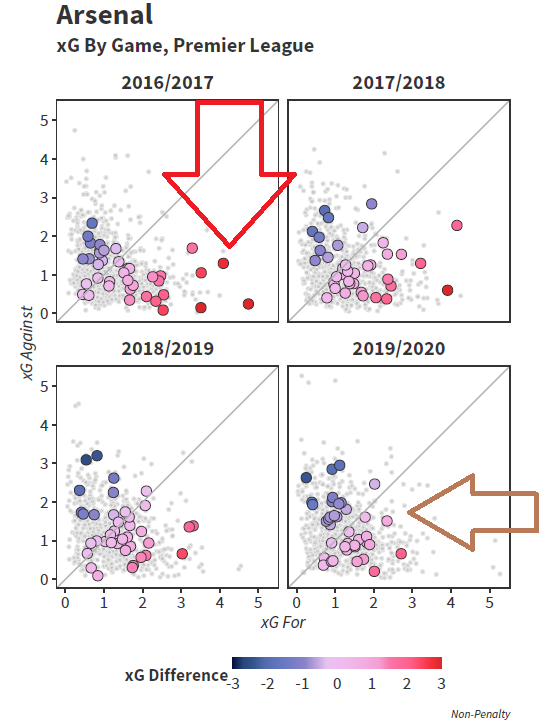A manager change. A global pandemic. A 10th place finish in expected goal difference. Another FA Cup trophy at the end of it. And then the release of seemingly the entire scouting department plus the firing of Head of Football Raul Sanllehi to boot. What to even make of the 19-20 season from Arsenal?
Recruitment last summer was "fine," if overpriced. Wide forward had long been a need, and Nicolas Pepe filled it adequately, even though Arsenal probably overpaid for him by £25M. Kieran Tierney took ages to get healthy and settled, but once he started playing, he quickly became a fan favourite. 18-year-old William Saliba was purchased and then immediately sent back to Saint-Etienne to continue his education. And David Luiz was brought over from Chelsea as a rich man's Shkrodan Mustafi, in the hope that Unai Emery would never be forced to play both of them together on match day.
Combine those with the younger signings from a year before in Torreira, Bernd Leno, and Matteo Guendouzi, and it felt like Arsenal fans might have a reason to be optimistic.
Except... well.
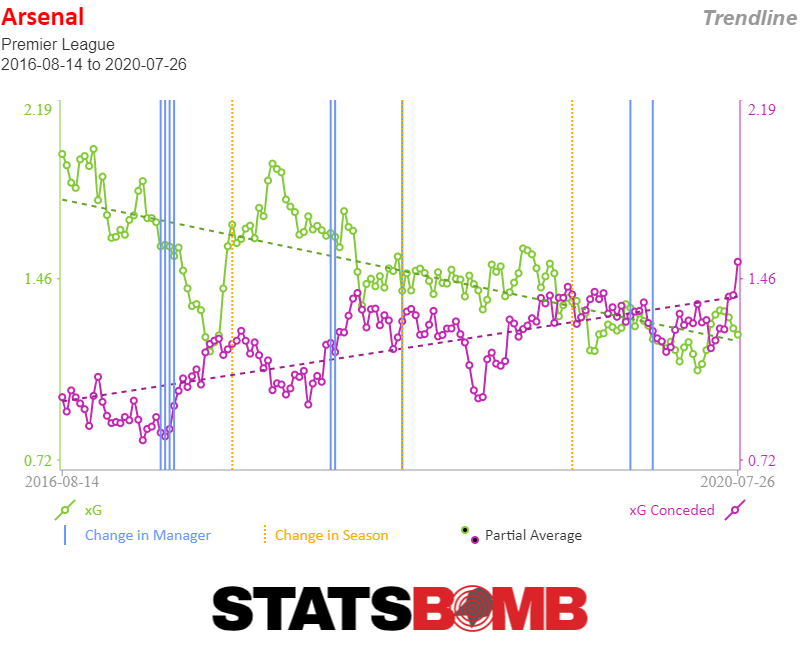
My worry with the hire of Unai Emery was that Arsenal would sacrifice the funky attacking patterns that were a hallmark of Arsene Wenger's era in exchange for stabilising the defence. The reality was that Emery never stabilised the defence while the attack did indeed become a hell of a lot less fun.
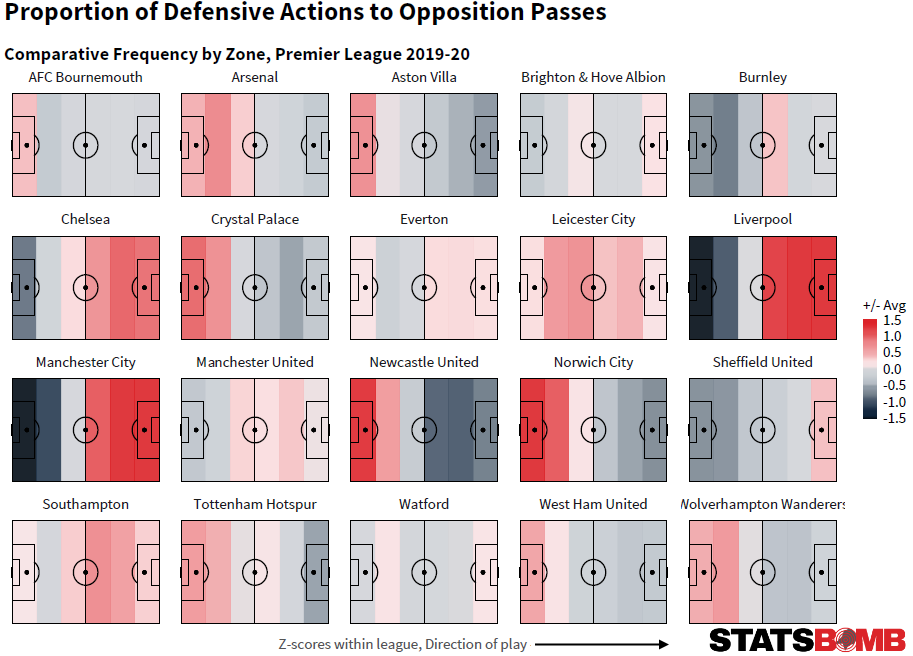
Along with frustrations over recruitment toward the end of the Wenger era, including a complete lack of inbound young attacking talent, one of the points I had hoped Arsenal would address with a new manager was to become more aggressive in the high press. The low block and occasional pressing style under Steve Bould (from the late Wenger years) was just effective enough for fourth, but no more than that. My hope was that Arsenal would dial up the pressure and move up the table as well.
Unfortunately under Emery, Arsenal not only forgot how to dominate the ball, they also forgot how to dominate... anything.
The lack of an elite defence (see Manchester United) combined with relative dross on the attacking end, meant Unai Emery was shown the door after a string of poor results in November. Speaking to one club insider this past summer, they stated that the writing was already on the wall for Emery after season 1, which made it even more strange that Sanllehi wanted to extend his contract. They also felt the summertime splash in the transfer market made little sense with a lame duck manager, which isn't wholly unfair.
Reading between the lines, the state of Arsenal's upper management in recent years can be described as "bumpy" at a minimum, and ranges to "complete flaming chaos with a side of potential corruption" for those who were both present and particularly descriptive of the situation.
Enter Mikel Arteta
Allegedly, Arteta was nearly hired to succeed Arsene Wenger before a change of heart saw Emery take the reins in summer 2018. A season and a half later, Arteta entered the club with his first chance at being a head coach. Before moving forward, however, it makes a little bit of sense to step back.
In spring of 2017, Arsenal did a very quiet set of interviews with top head coach candidates in preparation for Wenger leaving the club. On the potentials list were a variety of names, including Thomas Tuchel and Roger Schmidt. (I heard Marcelino was mooted as well, but I don't know anything beyond rumour there.) Tuchel would later replace Emery at PSG and take them to the CL Final this summer, while Schmidt finished out his time in China before taking a break from football, and was recently hired to coach similarly-abbreviated but not-remotely-the-same-stature club PSV. I note this because at one time it seemed fairly clear Arsenal were looking for tactical styles that included a regular high press.
In addition to playing under Arsene Wenger, Mikel Arteta spent three seasons coaching and learning from Pep Guardiola, not only one of the greatest coaches in modern football, but also an advocate of the... you guessed it... high press playing style.
The problem for coaches taking over mid-season is that it's really hard to find the training time to teach defensive structure changes. This is especially true when the team they take over are also involved in Europa League play and make deep runs in domestic cups - there just isn't enough time on the training pitch to completely revamp the principles. So it wasn't entirely surprising that Arteta's Arsenal team played similarly to Emeryball, with perhaps a bit better tactical understanding.
This is especially true when you consider that most of the post-pandemic run-in were games where the results didn't matter, at least for Arsenal. Combine a potential lack of motivation in the league run-in (and a focus on the FA Cup) with four red cards in the 21 matches after Arteta took over, and you get a sense that the headline averages don't tell the whole story.
What was slightly surprising, was that the team started to put up honest-to-god results against Big 6 teams for the first time in... well, seemingly forever. Arsenal beat Liverpool in the league, then Man City and Chelsea in the FA Cup before defeating Liverpool on penalties in the Community Shield. This was new. This was different. Even if the process wasn't exactly sterling - Arsenal were still losing the expected goals battles - the results were... good?
But are they sustainable? Ahhhh, there is the rub.
How do Arsenal get better in 2020-21?
A) Recruitment Arsenal's squad have been an army of misfit toys for a while now. They have talent, but the elite players seem to play the same positions (Aubameyang and Lacazette), and there are almost no peak age players (24-27) in the squad. From a squad building perspective, it has been messy for years.
Possibly the biggest need in the squad this summer was retooling the centreback rotation. If Guardiola's style is anything to go by, Arteta will require ball-playing CBs with pace. William Saliba is extremely young, but the potential answer to part of that equation. The addition of Gabriel Magalhaes from Lille looks to be another potential answer. However, given the ages, my guess is that these two will rarely play together as a pairing this year.
Which leaves you with the rest of the centrebacks. Mustafi looked mostly competent post-pandemic right up until he reverted to his tradition Arsenal form of calamitous mistakes in the last few matches. If calamity is the baseline, the brief purple patch has to be considered an outlier. Relying on him is not a thing most coaches would do by choice. Sokratis has been deemed surplus to requirements, and given his age when he arrived from Dortmund was always a stopgap measure. Pablo Mari looks to be a man mountain, but injury in the opening minutes of the season's return meant we have basically nothing further to evaluate him on aside from being large and left-footed. It's a start, at least?
Rob Holding is likely to be a loanee this season, lacking both the pace and the passing to be a top tier CB, though he's a serviceable Premier League one and was bought for a pittance from Bolton.
Calum Chambers is... still under contract.
That leaves us with the variance of David Luiz. Luiz's tenure at Arsenal has been plagued largely by mistakes and red cards, which is why it came as a surprise that he signed a contract extension early in the summer and looks set for another season at the club. Fans were left muttering, "Kia taketh, but when doth he give?" Willian on a free was presumably not the hoped for answer.
While Gabriel and Saliba are probably the future, the present looks somewhat uncertain.
Equally uncertain is the midfield composition. Convincing Dani Ceballos to return was vital - he was Arsenal's most important midfielder after the pandemic return, and offers versatility as well as top quality production. Xhaka has the passing but lacks the legs to be one of the elite players at his position, and then you hit... well, we don't know yet.
Torreira is likely to be sold, Guendouzi as well, and Arsenal wish Ozil would wriggle himself into a move anywhere but here. Which leaves the cupboard fairly threadbare when it comes to central midfielders. Outgoings could fund a high level incoming like Aouar (which would be fairly impressive recruitment coup), but even adding a player of that calibre means quite a few minutes for Joe Willock to gain experience. Maitland-Niles looks like RB1 if Bellerin leaves to pursue trophies and fashion in Paris, which leaves Bukayo Saka as a pacey flex-8 and almost no one else.
If Arsenal do sign Aouar, they'll hope for a return of his 20-year-old season under Bruno Genesio.
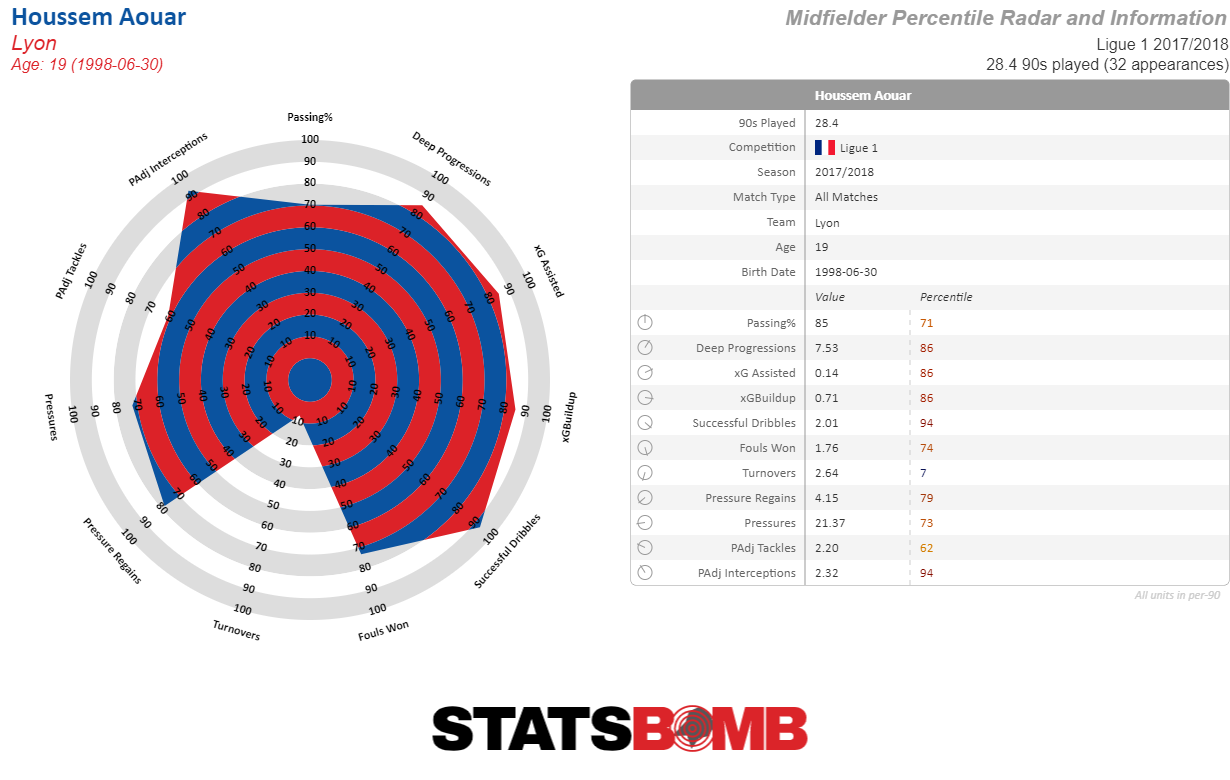
My thoughts on Thomas Partey I will revisit in a postscript.
The Kids
Signing Saka to a long-term extension was extremely important for both the Gunners and their fanbase. The academy production line has gone from almost nothing five years previous to churning out attacking talent that is only a small step below the best academies in the world. Saka broke through and regularly looked like one of the better players on the pitch playing in the Premier League at age 18. Losing that type of talent would have been heartbreaking, even if Arsenal don't quite know his best position yet.
Nketiah (21) isn't quite ready to lead the line, but he's probably only a season or two off and also needs lots of minutes to finish his development. Reiss Nelson (only 20) is more of a question mark, and this is especially true with the signing of Willian. My guess is Arteta felt he wasn't going to be good enough to be the second option wide right, which means Nelson probably goes into the Sales/Loans pile to generate enough funds to fill out the squad, but I could be wrong.
Before his injury, Gabriel Martinelli looked like a wonderkid, and it is hoped he'll continue to develop into an elite attacker even if he probably won't be back in action until the winter.
Arsenal's attacking youth are a bit too young and a bit raw, but are already good enough to merit either decent minutes in the league and cup competitions, or to generate enough sales revenue to fund additional transfers.
B) Defensive Style
"No playmaker in the world can be as good as good counter-pressing." - Jurgen Klopp
One of the ways Arsenal can get better as a team is by playing a better defensive style. High pressure is related to both fewer expected goals against and to generating additional expected goals in attack. Arsenal as a whole lack some creativity in attack, and I'm not sure they are going to be able to fix that in the transfer market this window.
However, in the absence of elite creative players, gegenpressing and learning to transition more and better can still help generate additional, almost free goals. The test here will be whether Arsenal have the personnel to do it, and whether Arteta can get them playing it well in time for the new season.
Even if they aren't elite at it to start (and neither Klopp's LFC nor Pochettino's Spurs were), committing to this style and improving at it over the course of the season is a useful goal unto itself. And potentially necessary to help generate more goals from a team that doesn't look like it will add creative firepower until potentially January at the earliest.
C) Set Pieces These went from a mild success under Emery to a moderate disaster under Arteta both in attack and defence. Andreas Georgson has been brought in to help improve this phase of the game and I wish him all the best. Even if he makes it so I stop wincing every time Arsenal face a defensive corner, I will consider this a success.
D) Behaviour With a Lead
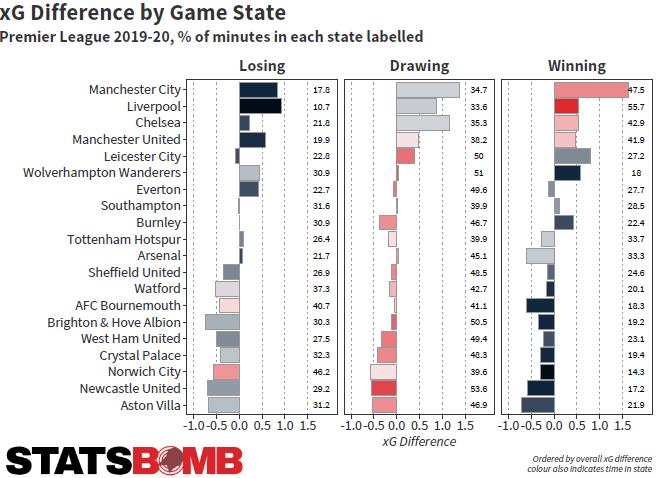
This one is subtle, but it was a massive problem throughout the course of last season. Arsenal had the fourth worst expected goals difference in the league when they had a lead.
All of the top 6 teams had a positive expected goal difference with the lead. The best teams look to extend leads, not protect them. Protecting leads is a recipe for 14 draws in 38 league matches and another likely midtable finish.
To put this another way - when playing with a one-goal lead, Arsenal became relegation candidates. They had 36% of the expected goals, 32% of the total shots, but still managed 47% of the goals. Luck? Talent? Bit of both probably, with a strong worry that it won't be repeatable should they try it again.
This is typically a tactical choice, and one that needs to change if Arsenal are going to challenge for anything useful this season.
Conclusion
An optimist would look at the FA Cup trophy and numerous victories against the Top 6 as a positive sign. They will also take hope in the idea that Arteta should put in a similar defensive system to what Pep runs at City, even if they are cautious that Arsenal may not have the players to execute that style particularly well for at least another year.
A pessimist will look at the average numbers on both sides of the ball under Emery and Arteta, and conclude that Arsenal have not been Actually Good since 2016-17 and there are no obvious signs of getting better. They will also look at the mess at the top of the club and mixed bag of recruitment as further proof that Arsenal are not ready to pull out of their slide into mediocrity just yet.
Myself, I lean toward optimism. I think the results suggest a better process is on the way, and that's backed up by my eye test when I watch this team execute tactically now versus what it was like under Unai Emery.
A top 4 challenge is probably a little less than a coinflip, especially with the firepower Chelsea have brought in this summer, but if better tactical choices are made, a return to the top 6 is fairly likely.
--Ted Knutson
@mixedknuts
Post Script

I moved this down here because it requires some time and some nuance to explain and I didn't want to clutter up the preview with additional nonsense.
If you prefer the podcast version of this argument, you can find it here: https://soundcloud.com/statsbomb-pod/statsbomb-podcast-july-1-q-a
I said this back in June and I stand by it. I also followed up that tweet with additional reasoning.
First, "free" isn't free. In many cases free simply means taking 30-50% of the transfer fee a team would normally pay and adding it to the player's wage packet. So instead of Partey making £200K a week, he now makes 300 or 350K a week. Given his age - he would be starting his contract at 27 - this means Arsenal would be taking a HUGE risk if Partey didn't work out.
When it comes to squadbuilding, taking big risks on older players with giant wages and potentially low resale value is a terrible idea. Occasionally it works out - Aubameyang at Arsenal is one rare example and someone I would have been happy to buy at £50M but much less happy with at £70M - but mostly it doesn't and it means you are stuck with a player that has declining output and who may become effectively unmoveable.
(There are a million zillion examples of this, but the one that always strikes me is how often Manchester City did this until a couple of years ago. Fernandinho worked out alright, but a ton of those others guys did not (Navas, Negredo, Bony, Nolito), and the failure to keep younger fullbacks around basically cost City a title in Pep's first season at the club.)
Beyond the age, and the wages, and the squadbuilding principles, I just don't see good data-based reasons to be excited about Partey.
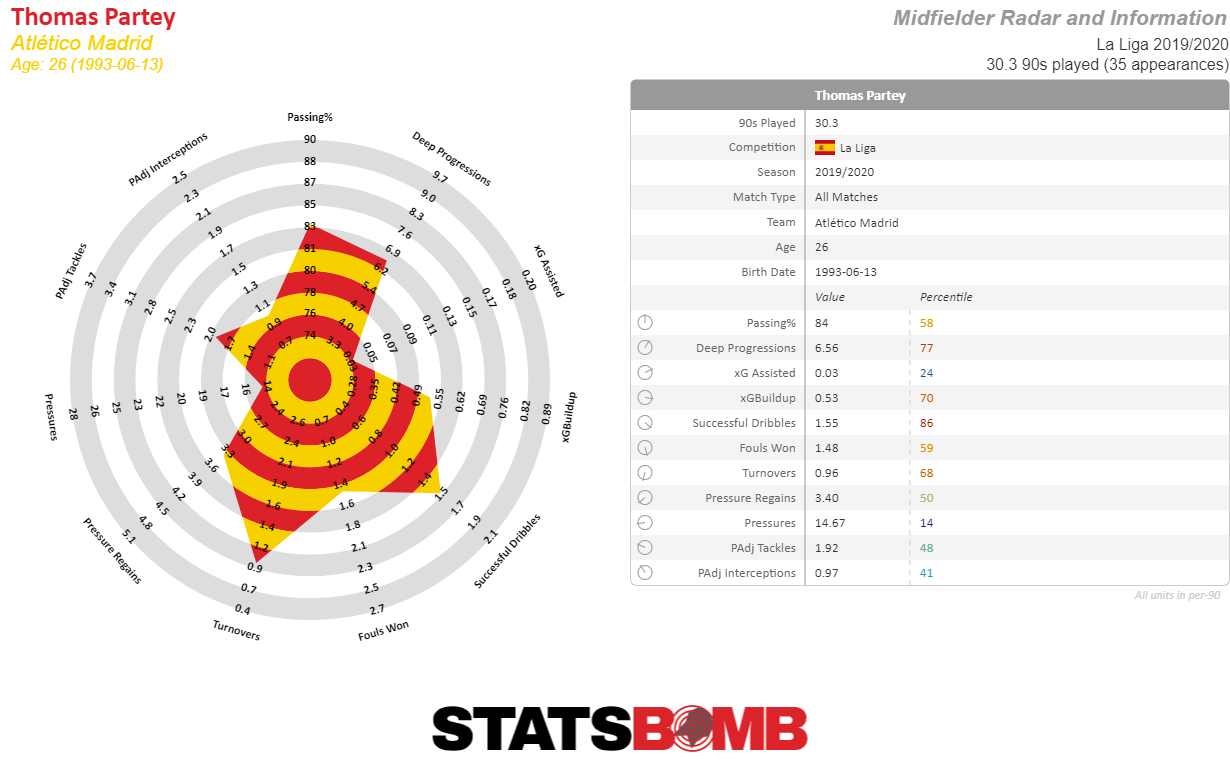
If you're splashing the cash, you really want scouting and data to both be excited about a player. That's not output I want to spunk £50M and big wages on. Or big wages and a 5-year contract.
He was amazing against Barcelona! Great, then why wasn't he amazing against all the other teams in La Liga last season?
Atletico are weird tactically, and his stats are not reflective of how he will play elsewhere. Again, fine... but we can ONLY judge his output from Atletico because that's the only place he's played since 2015. This increases the risk that the transfer goes wrong.
He's an elite defensive midifelder! His output looks nothing like an elite defensive midfielder.
He's NOT a defensive midfielder, he's a box-to-box midfielder who is great on the ball. Okay, but he also doesn't score goals or create goals for his teammates, so what are you actually paying for?
Transfer shopping is all about correctly evaluating and mitigating risk. If you are going to spend big, there needs to be very little risk something doesn't work out, and hopefully some upside involved as well. Liverpool don't make mistakes on transfers. That's why they are where they are now, despite finishing 8th as recently as 15-16. If you buy young guys and they don't work out, at least you can sell them on at a small loss and roll the dice again (Lucas Torreira). But if you buy/sign an older player on big wages and they don't work out, you are dead. You either have to eat a ton of their wages to move them on, or they stick around until the end of their contract with declining production.
My perspective on Arsenal and transfers has been the same for years now. I think they should not be building to try and finish 4th and make the Champions League.
I think they should be building a squad to try and finish first, even if that's one or two years down the line. And the way you do that is not via signing 27 and 28yos... you do it via taking some risk on 21-24 year olds, hoping your analysis is good, and letting them mature into elite players while improving the style of play.
